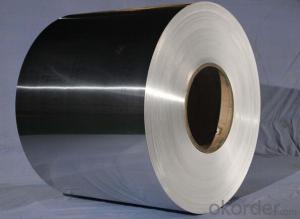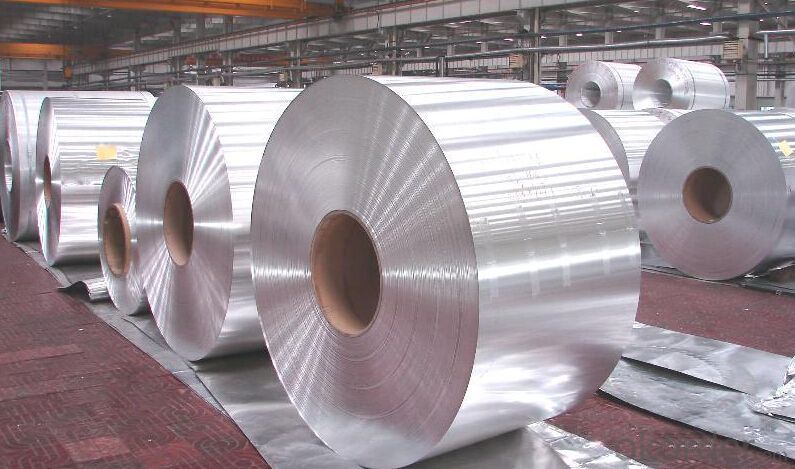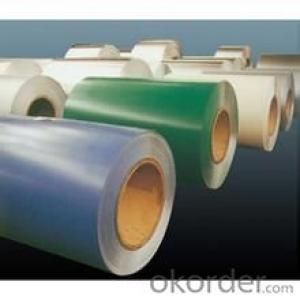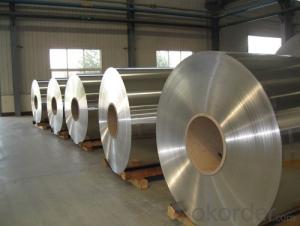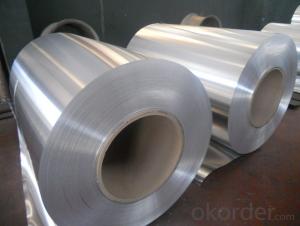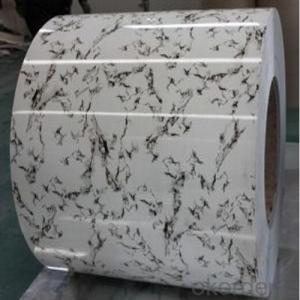Wood Grain Aluminum Coil Stock - Alloy 1100, 1060, 1200
- Loading Port:
- Shanghai
- Payment Terms:
- TT OR LC
- Min Order Qty:
- 5 m.t.
- Supply Capability:
- 6000 m.t./month
OKorder Service Pledge
OKorder Financial Service
You Might Also Like
Specification
Applications:
Aluminum foil roll is widely used in construction,decoration,hardware,
electric appliances,machinery and other industrial and civil purposes,
such as electronic capacitor,composite cooker,rice cooker,refrigerator,
computer casting,telecommunication,equipment,lamp shade,air conditioner,
cosmetics cover and so on.
Or it can be made as customers’ requirement.
Specifications
color aluminum coil
1000 series 1100 10160 1200
surface could be: Brushed, drawing, embossed, printing
color: red,
color aluminum coil
.Alloy type: 1050/1060/1100/1350
2.Temper: H16, H18, H22, H24
3.Thickness range: 0.1mm-4mm
4.Width range: 25mm-1600mm
5.Surface:finish: bright & smooth surface, without flow lines, slight oiled to avoid white rusting.
6.Quality material:totally free from such defefects as roll marks, edge damager, camber, white rust, oil patches, holes, break lines,
color aluminum coil
Name |
color aluminum coil |
Alloy or not | yes |
Alloy | 1100H16/18, 3003H24,3003H26,3005H26,8011,3004,3105,5005,etc. |
Thickness | 0.1-4mm |
Width | ≤1600mm |
MOQ | 5T |
Coating finish | Brushed, drawing, embossed, printing |
Color | As to code RAL |
Surface | Embossed,Mill Finish,Coated,Brushed |
Gloss | 10-90%(EN ISO-2813:1994) |
Total coating thick | PVDF27 ~35micron |
Polyester18~27micron(EN ISO-2360:1995) | |
Coating hardness | 2H |
Adhesion | 5B (EN ISO-2409:1994) |
Impact resistance | No cracking and peeling (A.S.T.M D2794-1993) |
Flexibility (T-bend) | 0T- 2T |
MEK resistance | 100 |
Certification | ISO9001:2000, CE, SGS |
Coil's standard diameter | 1100mm |
Inner Diameter | 405mm/505mm |
Coil's standard weight | 2000kgs |
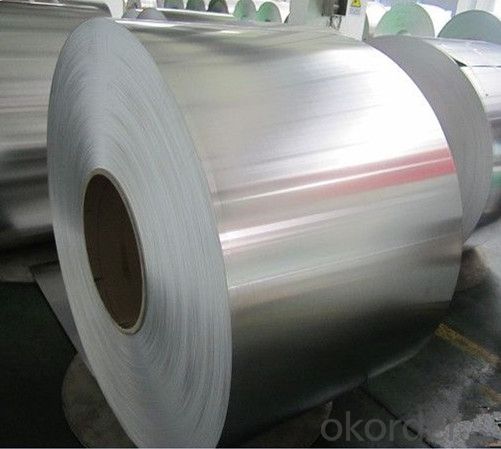
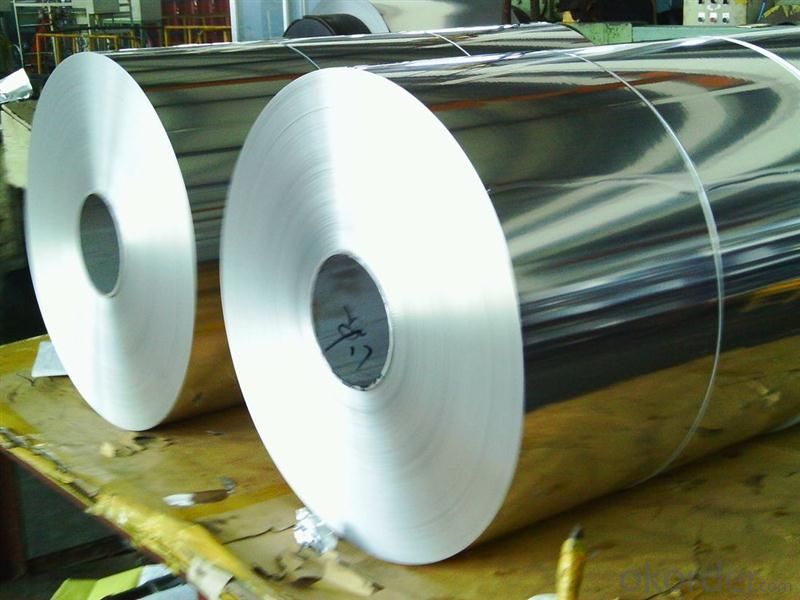
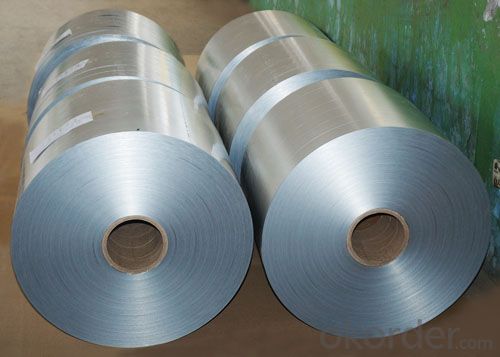
- Q: Why does aluminum foil burn in the microwave but not in the oven?
- Because of the conductive nature of foil intensifies the microwaves in small areas of the foil to a temperature far greater than can be achieved in an oven.
- Q: How are aluminum coils processed to achieve desired mechanical properties?
- Aluminum coils are processed using various techniques to achieve the desired mechanical properties. One commonly used method is called annealing. Annealing is a heat treatment process in which the coils are heated to a specific temperature and then cooled slowly. This process helps to reduce internal stresses and improve the metal's ductility and toughness. Another important process is cold rolling. Cold rolling involves passing the coils through a series of rollers at room temperature to reduce their thickness and improve their mechanical properties. This process not only increases the strength of the aluminum but also enhances its surface finish. To further enhance the mechanical properties, aluminum coils can also undergo alloying. Alloying involves mixing the aluminum with other elements like copper, manganese, or magnesium to form specific alloys. These alloys offer improved strength, corrosion resistance, and other desirable properties. Additionally, aluminum coils can be subjected to heat treatments like precipitation hardening. This process involves heating the coils to a specific temperature and holding them there for a certain period, followed by rapid cooling. Precipitation hardening allows the metal's microstructure to form fine particles, which increase its strength and hardness. Lastly, surface treatments such as anodizing or painting can also be applied to aluminum coils to enhance their mechanical properties. Anodizing forms a protective oxide layer on the surface, improving corrosion resistance, while painting provides additional protection and aesthetic appeal. In summary, aluminum coils are processed through techniques such as annealing, cold rolling, alloying, heat treatments, and surface treatments to achieve the desired mechanical properties. These processes can enhance the strength, ductility, toughness, and corrosion resistance of the aluminum, making it suitable for a wide range of applications.
- Q: I'm wondering if there is a resin/molding material that can withstand the heat of melted aluminum for casting parts. I know that sand casting is the 'norm' but is there anything else? I'd rather not have to pack sand every time I want to cast a part.Thanks!
- One common mold material for metal casting is plaster mixed with silica sand to give it more strength. It needs to be completely (like heated) dry before you use it, but it is actually more work than sand casting but it gives a better finish. There are some rubber materials which can withstand the heat of casting pewter, but the melting point of pewter is so much lower than aluminum that I am sure those won't work for aluminum. I think you are pretty much stuck with sand for the easiest method.
- Q: Almost every restaraunt uses aluminium foils and polyehylene for packing foods - that you carry to home.How safe is this ?For how long would the temperature be mainitained ?and within what time if consumed and is it safe ?
- Yes, it's perfectly fine You want to get it refridgerated within 1-2 hours of consuming the food and only keep it for up to 3 days. After that toss it.
- Q: Can aluminum coils be used for architectural facades?
- Indeed, architectural facades can make use of aluminum coils. The lightweight, durable, and versatile nature of aluminum makes it a favored option for such purposes. With the ability to mold aluminum coils into diverse shapes and sizes, one can create unique and visually pleasing facades. Furthermore, aluminum demonstrates resistance to corrosion, rendering it suitable for outdoor use. Moreover, aluminum allows for easy coating or finishing, enabling an improved aesthetic appeal and protection against environmental factors. All in all, aluminum coils offer an economically viable and environmentally friendly alternative for architectural facades.
- Q: What are the various applications and purposes for which aluminum coils are utilized?
- <p>Aluminum coils have a wide range of applications due to their lightweight, corrosion resistance, and malleability. They are commonly used in construction for roofing and siding, in the automotive industry for car parts and body panels, in the packaging industry for cans and foils, and in electrical applications for wiring and transformers. Aluminum coils are also used in the manufacturing of heat exchangers, cooking utensils, and various consumer products. Their versatility makes them an essential material in many industries.</p>
- Q: What are the common handling and storage practices for aluminum coils?
- The common handling and storage practices for aluminum coils include wearing protective gloves and eyewear when handling the coils to prevent injuries. It is necessary to handle the coils carefully and avoid dropping or dragging them to prevent damage. Additionally, coils should be stored in a dry and well-ventilated area to avoid moisture buildup and corrosion. They should be stacked on a flat and sturdy surface, with proper support and spacing between each coil to prevent deformation. Regular inspections and maintenance should be conducted to ensure the coils are stored and handled correctly.
- Q: Is it possible to utilize a grinder for cutting an aluminum coil?
- <p>Yes, you can use a grinder to cut an aluminum coil, but it's important to use the right type of grinder and blade. An angle grinder with a cutting wheel or a metal cutting disc is suitable for this task. Ensure the grinder is powerful enough for the thickness of the aluminum coil and that you're using the correct safety equipment, such as goggles and gloves. Keep the cutting area clear of debris and ensure good ventilation to avoid inhaling aluminum dust, which can be harmful. Always follow the manufacturer's instructions for your specific grinder model to ensure safe operation.</p>
- Q: Which is more unhealthy the bleached parchment paper or the aluminum from the pan?
- Parchment paper is siliconized and the aluminum is stabalized. Based on that choice you're not any more or less safer with either or both.
- Q: This question asks about potential health hazards linked to the use of aluminum coils in culinary settings.
- <p>There are some concerns about using aluminum cookware due to the potential for aluminum to leach into food, especially at high temperatures or in acidic environments. While the human body needs small amounts of aluminum, excessive intake can be harmful. It has been linked to neurological disorders, although the evidence is not conclusive. Most health organizations, including the FDA, consider aluminum cookware safe for general use. However, for those who are concerned, alternatives like stainless steel, cast iron, or non-stick coatings are available. It's always best to follow manufacturer's guidelines and avoid using aluminum cookware for acidic or highly acidic foods to minimize any potential risk.</p>
Send your message to us
Wood Grain Aluminum Coil Stock - Alloy 1100, 1060, 1200
- Loading Port:
- Shanghai
- Payment Terms:
- TT OR LC
- Min Order Qty:
- 5 m.t.
- Supply Capability:
- 6000 m.t./month
OKorder Service Pledge
OKorder Financial Service
Similar products
Hot products
Hot Searches
Related keywords
